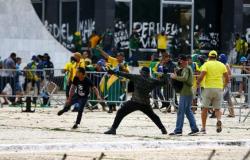For the first time since it was created, in November 2002, the Amnesty Commission approved a request for collective reparation for serious violations of the rights of indigenous communities during the military regime (1964/1985).
In addition to recognizing the serious consequences of state action and omission against members of the Krenak and Guarani-Kaiowá ethnic groups, the members of the collegiate agreed to a formal apology on behalf of the Brazilian State. They also approved a series of recommendations to be implemented by public bodies in order to prevent the events from happening again.
“I wanted to kneel before you. I am very emotional, but, on behalf of Brazil, the Brazilian State, I want to apologize. And may you take this apology to all your people, on behalf of the Amnesty Commission and the Brazilian State”, said, on her knees, the president of the commission, lawyer Enéa de Stutz e Almeida, to the representative of the Guarani community. kaiowá, whose request for reparation was the second to be judged and approved this Tuesday (2). Enéa de Stutz e Almeida repeated the gesture in front of representatives of the Krenak community.


President of the Commission, Enéa de Stutz e Almeida, apologizes on her knees to the Krenak and Guarani-Kaiowá communities – Frame/MDHC/Youtube
Linked to the Ministry of Human Rights and Citizenship, the Amnesty Commission is responsible for analyzing amnesty processes motivated by state political persecution between September 1946 and October 1988. Last year, council members approved changes to the internal regulations of the collegiate body, enabling the presentation of collective amnesty requests. The requests from the Krenak and Guarani-Kaiowá communities are the first to be judged in the country.
“We debated a lot and concluded, with the help of many people besides the commission’s council, that, in relation to indigenous peoples, for example, the individual application does not make much sense. What makes sense for these communities is exactly collective reparation”, explained the president of the commission, lawyer Enéa de Stutz e Almeida.
In the requests presented to the commission, the Federal Public Ministry (MPF) maintains that, between 1957 and 1980, indigenous peoples in general, and not just the Krenak and Guarani-kaiowá communities, were the target of government and business intervention in their territories, which resulted in deaths, violations of physical integrity and profound disintegration of their traditional ways of life.
In 2014, the National Truth Commission concluded the report on its two years and seven months of investigations into human rights violations committed during the period of the last Brazilian civil-military dictatorship, pointing out that at least 8,350 indigenous people were murdered and many others suffered violence and abuses of all kinds. Furthermore, already in 1968, an extensive document, the so-called Figueiredo Report, prepared at the request of the extinct Ministry of the Interior, of the military government, highlighted a series of barbaric crimes committed against indigenous peoples.
“Their rights were disrespected, both in relation to their lands and their freedoms. And the military governments were characterized by disrespect for indigenous institutions and the systematic expulsion from their traditional territories, as well as the vulnerability and biological and cultural destruction of their communities”, added, today, the rapporteur of the Krenak amnesty request, counselor Leonardo Kauer Zinn, for whom the “acts of the military dictatorship caused the social and cultural disintegration of the Krenak people”.
“Today, there is no difficulty in analyzing the merits of this request. We are faced with a remarkable body of evidence brought to the case file. In addition to the evidence produced listed exhaustively in the report, it is necessary to recognize that cases of violations of the rights of indigenous peoples are certainly among the most extensively documented. Quality academic literature in different areas of knowledge gives an account of the rapes, persecutions, torture and extermination that befell the Krenak”, pointed out Zinn, citing, as an example, the installation, in 1969, in the city of Resplendor (MG), of the so-called Krenak Indigenous Agricultural Reformatory, where indigenous people from all over the country, considered “rebels”, were sent under the pretext of being “re-educated”.
“The reformatory became so famous that many people, when they hear the word krenak, think they are talking about the prison and not the indigenous people. The National Truth Commission itself has already recognized that the reformatory, as well as the Guarani Farm, installed in the city of Carmésia (MG), with its nationwide scope to arrest “rebellious Indians” from 23 ethnicities, “take on the character of a concentration camp” [indígena],” Zinn recalled.
In cases of collective requests, recognition of amnesty requests does not provide for economic compensation. For the president of the National Foundation of Indigenous Peoples, Joenia Wapichana, who attended the trial session in person, the decision is an important recovery of the memory of facts that are still little known.
“Memory is very important for indigenous peoples. Thanks to her, we know where we came from and where we want to go. It is not simply erased. It serves to correct mistakes and make things right, especially in the administration of a country. It is essential that this memory is made public. For us, both indigenous people and Funai, it is important to be visible. Not just in reports – because we know there was a lot of violence – but also in terms of reparations and public policies. So that errors and violence are, in fact, repaired and brought to justice”, commented Joenia, adding that “all indigenous peoples deserve justice”. “Historic reparation is extremely important.”
Tags: Commission approves unprecedented pardon request violations dictatorship
--







